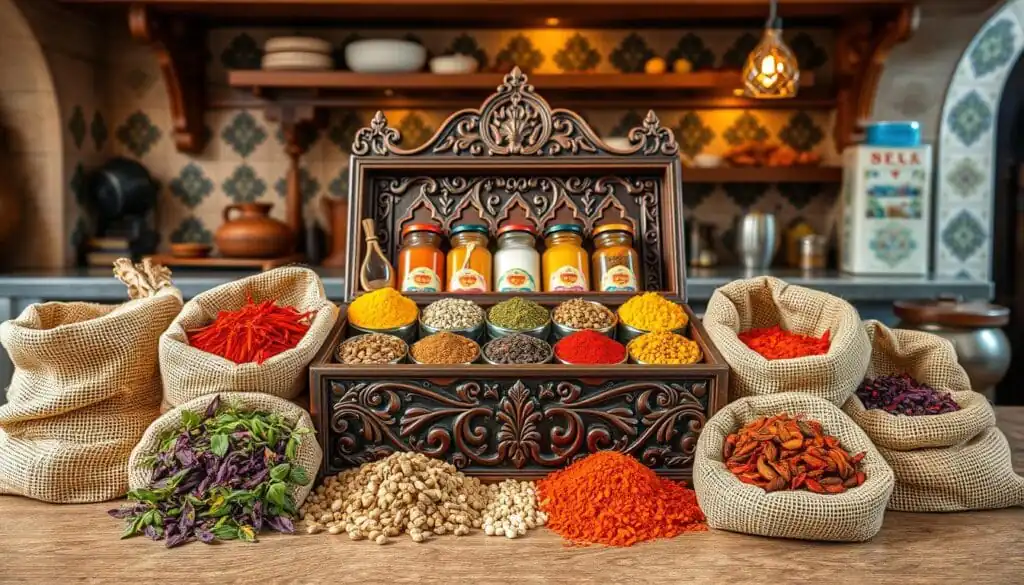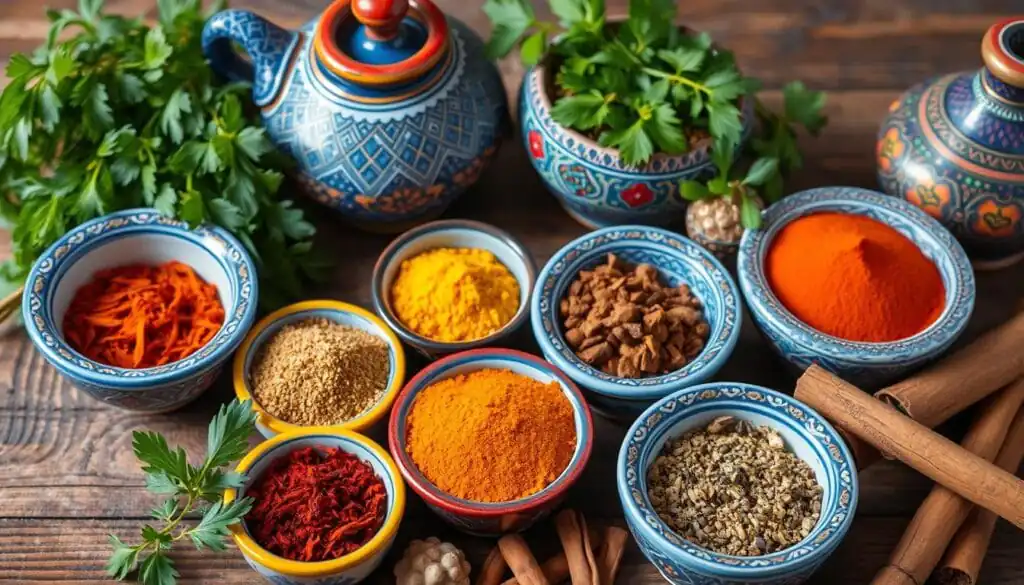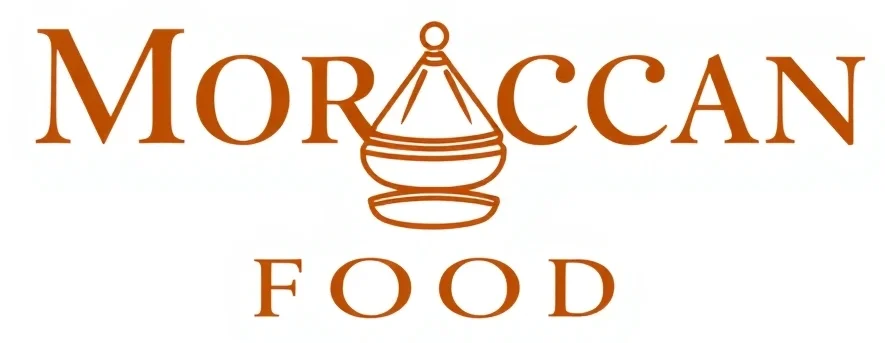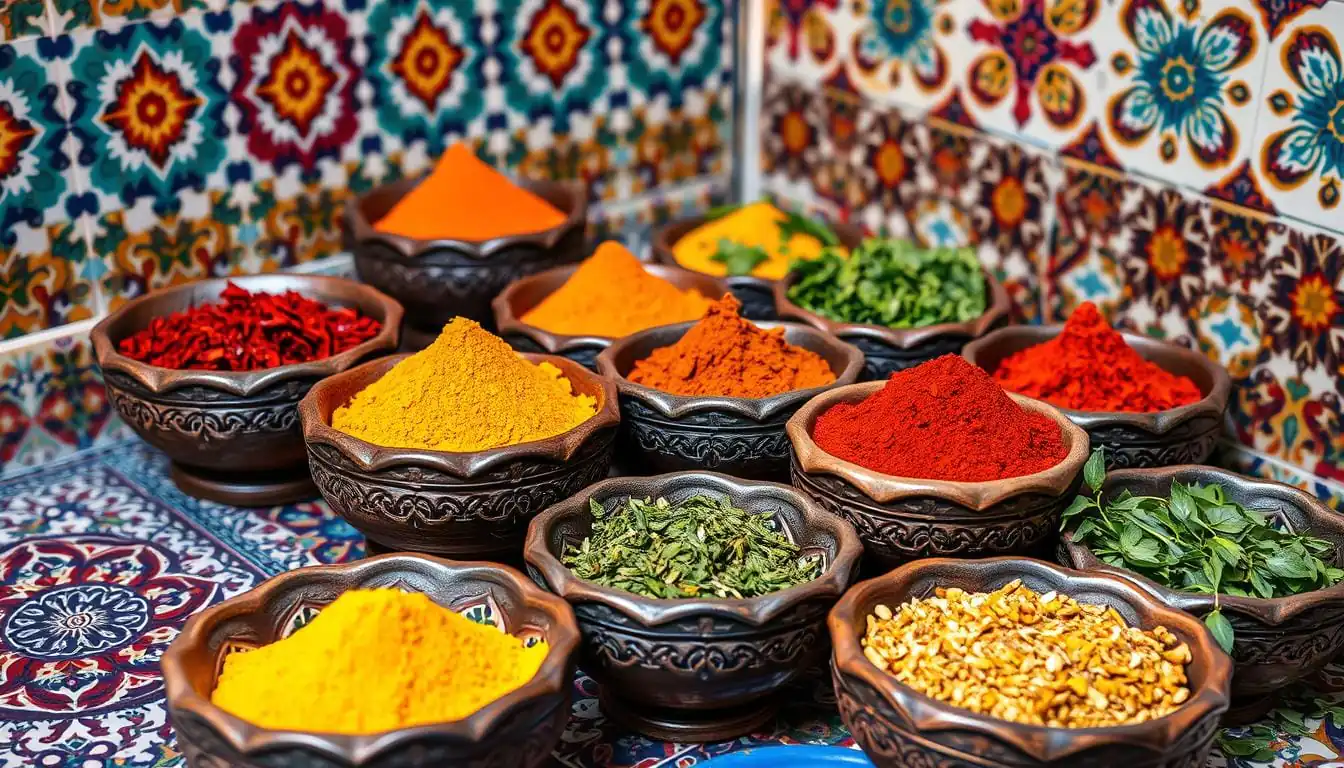Moroccan Spices: BEST Spices, A Complete Guide to Traditional Flavors
Table of Contents
As you explore Moroccan spices, you’ll find a wide range of authentic spices. These spices will make your cooking even better. They add depth and warmth to many dishes.
Imagine making Moroccan flavors in your kitchen with spices like cumin, ginger, and paprika. Moroccan spices can make your meals exotic, from tagines to stews and soups. Whether you’re experienced or just starting, Moroccan spice will spark your creativity.
Discovering Moroccan spices, you’ll learn about different spices and their uses. You’ll find out about Ras el hanout and Chermoula marinade. These secrets will help you make delicious Moroccan dishes. With Moroccan spices, your cooking can go in many directions, and your taste buds will love it.
Understanding the Rich Heritage of Moroccan Spices
Moroccan cuisine is famous for its rich and varied flavors. These come from special moroccan spice blends. These blends mix spices like cumin, coriander, and turmeric to create a unique taste.
Exploring moroccan spice recipes means learning about the history and culture of spices in Morocco. This knowledge is key to understanding the flavors.
Using organic moroccan spices is crucial in Moroccan cooking. It ensures the spices are of top quality and chemical-free. This way, you can make tasty and healthy Moroccan dishes.
Some popular dishes that use these blends are tagine, couscous, and harira. They are all delicious and full of flavor.
To make your own moroccan spice blends, try mixing different spices. Use cumin, coriander, and cinnamon as a base. You can also add ginger and saffron for a unique taste.
By using moroccan spice recipes and organic spices, you can make dishes that will wow your loved ones. They will love the flavors and authenticity of your cooking.
Essential Moroccan Spices Every Kitchen Should Have
Every kitchen needs a few key spices for Moroccan cooking. These spices are crucial for making authentic and tasty Moroccan dishes. Must-haves include cumin, coriander, paprika, and cinnamon.
These spices are vital in Moroccan cooking spice blends. They add flavor and depth to your meals. For instance, cumin is a key spice in Moroccan dishes like tagines and salads. Coriander seeds give a citrusy hint to Moroccan dishes.
Here are some essential Moroccan spices for your kitchen:
- Cumin: used in tagines, salads, and other dishes
- Coriander: adds a hint of citrus flavor to dishes
- Paprika: provides warmth and smoky sweetness to Moroccan cuisine
- Cinnamon: used in savory dishes, providing a subtle sweetness and warmth
Having these spices in your kitchen lets you make many delicious Moroccan dishes. Always choose high-quality spices for the best flavor in your cooking.
Popular Moroccan Spice Blends and Their Uses
Exploring Moroccan cuisine reveals a variety of spice blends. These blends add depth and complexity to dishes. You can find these blends online or at a Moroccan spices shop. Ras el Hanout and Chermoula are two of the most popular.
Ras el Hanout, meaning “head of the shop,” is a mix of up to 30 spices. It includes cumin, coriander, cinnamon, and turmeric. It’s great for tagines, stews, and couscous. Chermoula, on the other hand, is a marinade made with parsley, cilantro, garlic, and spices. It’s used for fish, meat, and vegetables.
Key Ingredients in Moroccan Spice Blends
- Cumin: a basic spice in Moroccan cooking, commonly found in spice blends and dishes like tagines and couscous
- Coriander: adds a warm, earthy flavor to dishes
- Ginger: adds a spicy, warming flavor to dishes
- Paprika: adds a smoky, slightly sweet flavor to dishes
You can find these spice blends at a Moroccan spices shop or online. This lets you buy Moroccan spices online and try new recipes. Moroccan spice blends are perfect for adding flavor to tagines or couscous. They’re also great for experimenting with new dishes.
| Spice Blend | Key Ingredients | Typical Uses |
|---|---|---|
| Ras el Hanout | Cumin, coriander, cinnamon, turmeric | Tagines, stews, couscous |
| Chermoula | Parsley, cilantro, garlic, spices | Fish, meat, vegetable dishes |
The Art of Selecting Quality Moroccan Spices
Choosing the right authentic moroccan spices means focusing on freshness and smell. You want spices that taste great and are of top quality. Look for spices with a strong smell and bright color. Spices that look dull or smell musty are likely old or stored poorly.
Also, check how the spices are packaged. Choose spices in airtight containers to keep their flavor and smell fresh. Traditional moroccan spices often come in decorative tins or jars. But make sure the packaging is not damaged or tampered with.
Here are some tips for picking the best Moroccan spices:
- Choose spices from trusted suppliers
- Opt for spices labeled as “fresh” or “high-quality”
- Steer clear of spices that have been on the shelf too long
- Buying spices in bulk can help ensure they’re fresh
By using these tips, you can pick the finest authentic moroccan spices for your cooking. Whether you’re making a classic tagine or trying new recipes, quality spices are crucial. They greatly enhance the taste and smell of your dishes.
The secret to finding great Moroccan spices is to focus on freshness, smell, and packaging. With a bit of practice and patience, you’ll become skilled at picking the best spices for your recipes.
| Spice | Characteristics | Uses |
|---|---|---|
| Ras El Hanout | Complex blend of spices | Tagines, stews, and soups |
| Cumin | Earthly, warm flavor | Meat dishes, stews, and soups |
| Coriander | Citrusy, slightly sweet flavor | Salads, sauces, and marinades |
Where to Buy Authentic Moroccan Spices Online
Looking to buy Moroccan spices online? It’s key to find a reliable Moroccan spices shop. Now, with online shopping, getting authentic Moroccan spices is easier than ever.
Popular online stores offer a variety of Moroccan spices like saffron, cinnamon, and paprika. They get their spices directly from Moroccan artisans. This ensures you get the real flavors. Look for stores with different spice blends, like Ras el Hanout, which has up to 15 spices.
Trusted Online Retailers
Chef Hachem Hemingway started a Moroccan spices shop in 2014. It has over 20 authentic products, including spices and sweets. They even offer special deals, like a 30% discount on Shbakia sweets.
What to Look for When Shopping
When buying Moroccan spices online, focus on quality and authenticity. Choose stores that share detailed product info, like ingredients and origins. Also, check customer reviews to ensure you’re buying from a trusted source.
| Product | Price | Quality |
|---|---|---|
| Saffron | $10-$20 | High-quality, authentic saffron threads |
| Ras el Hanout | $5-$10 | Blend of up to 15 spices, sourced from Moroccan artisans |
By following these tips and shopping from trusted online retailers, you can easily buy Moroccan spices online. Enjoy the authentic flavors of Morocco in your kitchen.
Storage and Preservation Tips for Your Moroccan Spices
To keep your moroccan cooking spices fresh, proper storage is key. Spices can stay fresh for two to three years. Store them in a cool place, away from sunlight and moisture.
Here are some tips to help you preserve your organic moroccan spices:
- Store spices in airtight containers to prevent moisture and air from affecting their flavor and aroma.
- Keep spices away from strong-smelling foods, such as coffee, onions, or garlic, as they can absorb these odors.
- Check the manufacturing and expiry date of spices to avoid health hazards.
By following these tips, you can enjoy your moroccan cooking spices for a longer time. Remember to always check the freshness of your spices before using them in your cooking.

Proper storage is crucial to preserve the freshness and flavor of organic moroccan spices. Use miniature Ball jars or other airtight containers to store your spices. Soft foam drawer liners can also be used to organize your spices and keep them away from heat and light.
| Spice | Storage Tips |
|---|---|
| Turmeric | Store in a cool, dry place |
| Coriander | Keep away from direct sunlight |
| Black Pepper | Store in an airtight container |
Creating Your Own Moroccan Spice Blends at Home
To make your own Moroccan spice blends, you’ll need a few tools. A spice grinder or mortar and pestle are key. These tools help you grind and mix spices well, making sure your blend is just right.
When making Moroccan spice blends, try mixing different spices to find unique flavors. Ras el hanout and Chermoula are popular blends. Ras el hanout can have up to 80 spices, offering a wide range of tastes. Chermoula, a North African condiment, combines fresh herbs, spices, and citrus.
Essential Equipment Needed
- Spice grinder or mortar and pestle
- Measuring spoons and cups
- Airtight containers for storage
Step-by-Step Blending Instructions
Begin by picking the spices you want to blend. Choose from cumin, coriander, ginger, and cinnamon, among others. Grind the spices together in your grinder or mortar and pestle, then mix well.
Store your blend in an airtight container for up to six months. This keeps your spices fresh and flavorful.
Common Mistakes to Avoid
Don’t use low-quality spices when making your blends. They can ruin the flavor and aroma. Also, make sure to store your blend properly. This prevents the spices from losing their taste and smell over time.
Health Benefits of Traditional Moroccan Spices
Adding organic moroccan spices to your meals does more than just flavor them. They also bring many health benefits. For centuries, traditional moroccan spices have been used in folk medicine. They help with digestion and respiratory issues.
Moroccan spices are known for their anti-inflammatory, antioxidant, and digestive benefits. Turmeric, a key spice, fights inflammation and helps the liver. Ginger treats stomach problems like nausea and colds.
Moroccan spice blends, like Ras El Hanout, offer even more benefits. They combine spices like cinnamon, nutmeg, and cloves. These spices are full of antioxidants and improve blood flow and reduce inflammation.
Some benefits of Moroccan spices include:
- Improving digestion and reducing inflammation
- Boosting antioxidant levels and reducing oxidative stress
- Supporting respiratory health and reducing the risk of respiratory disorders
- Aiding in blood sugar regulation and improving insulin sensitivity
Using traditional moroccan spices in your diet can be very beneficial. They add flavor and help with health issues. Organic moroccan spices are a great choice for a healthy diet.
Incorporating Moroccan Spices into Modern Cooking
Adding moroccan cooking spices to your cooking opens up a world of flavors. The best moroccan spices can transform your dishes. Start by trying fusion recipes that mix traditional moroccan tastes with new ingredients and methods.
For instance, spice up your stir-fry or season grilled meats and veggies with moroccan spices. You can also craft sauces and marinades like spicy harissa or flavorful chermoula.

Fusion Recipes and Ideas
Here are some fusion recipe ideas:
- Moroccan-style tacos with spicy lamb or chicken
- Grilled vegetable skewers with a moroccan-inspired yogurt sauce
- Moroccan-spiced lentil soup with a swirl of creamy harissa
By using moroccan spices in your cooking, you can elevate your dishes. A bit of creativity can lead to many tasty and unique recipes. These recipes will highlight the best of moroccan cuisine.
Seasonal Usage of Moroccan Spices in Traditional Cooking
Exploring Moroccan cuisine reveals how moroccan spice blends and moroccan spice recipes change with the seasons. This tradition is a big part of Moroccan culture. It celebrates the seasons with special flavors and ingredients.
In summer, Moroccan chefs use light, fresh spices like mint and lemon. They make cool dishes like salads and grilled meats. But in winter, they turn to warm spices like cumin, coriander, and cinnamon. These are used in comforting stews and slow-cooked tagines.
Some favorite moroccan spice blends for seasonal cooking include:
- Ras el hanout, a complex blend of spices that adds depth and warmth to winter dishes
- Chermoula, a bright and citrusy blend that’s perfect for summer salads and grilled meats
- La Kama, a traditional pepper blend that adds a smoky heat to autumnal stews and soups
Using moroccan spice recipes in your cooking adds flavor and variety. It also connects you to Morocco’s rich culture. Whether for a special event or just to spice up your meals, Moroccan spices will inspire and delight you.
Sustainable and Organic Moroccan Spice Options
When you buy moroccan spices online, think about the environment. Many big names in spices, like the Sustainable Spice Initiative, aim for green sourcing. They focus on making their top products better for the planet.
For eco-friendly choices, search for organic moroccan spices with good certifications. The EU Organic farming mark is a top sign of green food. Also, look for Rainforest Alliance, Fairtrade, and Ethical Trade Initiative Code of Conduct.
Some brands, like Santis from Morocco, lead the way. They export organic-certified products and follow strict green standards. When you buy moroccan spices online, pick companies that care about the planet and fair trade.
Here are some tips for choosing sustainable and organic moroccan spices:
- Search for EU Organic, Rainforest Alliance, and Fairtrade marks
- Go for companies that focus on green and fair practices
- Think about the environmental effects of spice making and shipping
By choosing wisely when you buy moroccan spices online, you help the spice world go green.
Conclusion: Embracing the Magic of Moroccan Spices in Your Kitchen
The world of Moroccan spices is full of flavors, history, and culture. From the famous ras el hanout to the versatile chermoula, these blends can take you to Marrakech’s busy souks. By using traditional Moroccan spices in your cooking, you open up a world of culinary adventures.
Whether you’re trying new Moroccan fusion recipes or making old favorites, these spices will make your dishes better. They add depth, complexity, and realness to your food. Let the magic of Moroccan spices guide you to discover the amazing flavors that have won hearts for centuries. Your kitchen is a blank canvas, so start creating with these incredible ingredients.
Have You Tried the Moroccan Recipes?
FAQ
What are the essential Moroccan spices every kitchen should have?
Every kitchen should have cumin, cinnamon, paprika, ginger, turmeric, coriander, and caraway. These spices are key to Moroccan cooking. They’re used in many traditional dishes.
What are the most popular Moroccan spice blends and how are they used?
Ras el Hanout, Chermoula, and La Kama are top Moroccan spice blends. Ras el Hanout seasons meats, couscous, and tagines. Chermoula is great for fish, seafood, and veggies. La Kama spices up many dishes.
Where can I buy authentic Moroccan spices online?
The Spice House, Kalustyan’s, and World Spice Merchants sell authentic Moroccan spices online. Look for spices labeled as Moroccan. They should smell strong and be in airtight containers.
How do I store and preserve Moroccan spices to maintain their freshness?
Store Moroccan spices in airtight containers, away from light and heat. Keep them in a cool, dry spot. Don’t store them in the fridge, as moisture can harm their flavor and smell.
What are the health benefits of traditional Moroccan spices?
Spices like turmeric, ginger, and cumin are good for you. They have antioxidants and anti-inflammatory properties. They can also help with digestion and overall health when part of a balanced diet.
How can I incorporate Moroccan spices into my everyday cooking?
Use Moroccan spices in more than just traditional dishes. Add Ras el Hanout to roasted veggies, or sprinkle cumin and paprika on chicken or fish. Try chermoula as a marinade for meats. Mix different spices to add flavor to your meals.
What are the best sustainable and organic Moroccan spice options?
Choose organic, fair trade Moroccan spices. This means they were grown sustainably and farmers were paid fairly. Look for brands like Frontier Co-op, Simply Organic, and Spice House.

